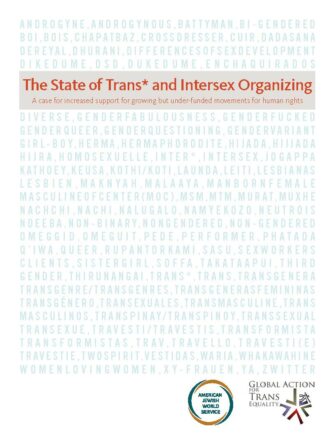NEW YORK, NY / BUENOS AIRES, Argentina – Global Action for Trans* Equality (GATE) and American Jewish World Service (AJWS) released today the results of the first-ever survey of transgender and intersex groups around the world in a new report, The State of Trans* and Intersex Organizing. The report is being presented on January 28 during the International Human Rights Funders Group’s 2014 San Francisco Conference.
The survey of 340 organizations documents the deep discrimination and multiple challenges facing trans* and intersex people and the organizing that they are leading worldwide to win their human rights. It also shows the significant funding shortfall facing trans* and intersex groups and the challenges and obstacles they face in obtaining resources to carry out their work.
While funding of lesbian, gay, bisexual, trans* and intersex (LGBTI) groups has grown in the past 10 years, the survey results show clearly that not enough funding has reached trans and intersex-led initiatives to address their priority issues.
“All around the world, trans* and intersex people face fierce discrimination, ceaseless violence and incalculable ridicule because of who we are. We also face barriers in pursuing education, obtaining health care and receiving fair treatment by police and other authorities. While a small number of foundations and donors understand that trans* and intersex communities need support as we advocate for justice, most do not. We urge other donors to take up this opportunity to advance human rights and fund our movements.”
Justus Eisfeld, Co-Director of GATE
“Through hard work and innovation, trans* and intersex organizations have advocated their way onto the human rights agenda worldwide. However, this movement cannot take the next step forward without more active partners and funding. There is an opportunity here for bold funders who are ready to provide financial support to breakthrough organizing and advocacy.”
Shari Turitz, Vice President for International Programs of AJWS
The survey looked at the financial and organizational capacity of trans* and intersex groups around the world, most of which provide critical support and services, including legal aid, health care, advocacy and leadership training. These groups are fighting discriminatory laws, empowering people to become trans* and intersex activists, and educating the public about trans* and intersex issues.
Findings
Below is a summary of the major findings of the survey:
- The trans* and intersex movements are young, diverse and growing rapidly. Almost one-third of the groups surveyed were founded in the past three years, indicating likely further growth in the coming years
- Groups feel strongly about the need to strengthen their ability to provide direct services to trans* and intersex communities while continuing to work to change societal attitudes and advocating for laws and policies that respect and promote their human rights
- Most trans* and intersex groups work locally, with only a few global and regional organizations
- While more than half of the groups surveyed are led by trans* and intersex people, a surprisingly large number are not
- Nearly half of the trans* and intersex groups that responded to the survey are not independent organizations but rather are programs of larger organizations with broader mandates beyond trans* and/or intersex work—and 42 percent of those groups reported having little or no say in financial decisions about their work
- Across the board, trans* and intersex groups operate on scarce resources, with more than half with a current annual budget of less than $10,000
- The groups surveyed do not have significant financial stability, with 68 percent reporting having no reserves or savings at all
- Trans* and intersex groups face enormous challenges in obtaining funding, such as not being able to find donors; not having the capacity for lengthy and complicated applications; or having needs that are different from donors’ goals. A large number of groups also complained about LGBTI or HIV and AIDS funding not reaching trans* or intersex groups
- The groups reported that government funding—whether from state or provincial governments, national governments or foreign governments—is the least likely source of funding for trans* issues overall
- Groups have three strong priorities for additional support to build their organizations and movements: networking and exchanges with other trans*/intersex groups; skills training, including fundraising; and mentoring programs for group leaders
- Lack of data on the number of trans* or intersex people in society appears to be a barrier for some donors, who may believe that the problem is not “big enough”






